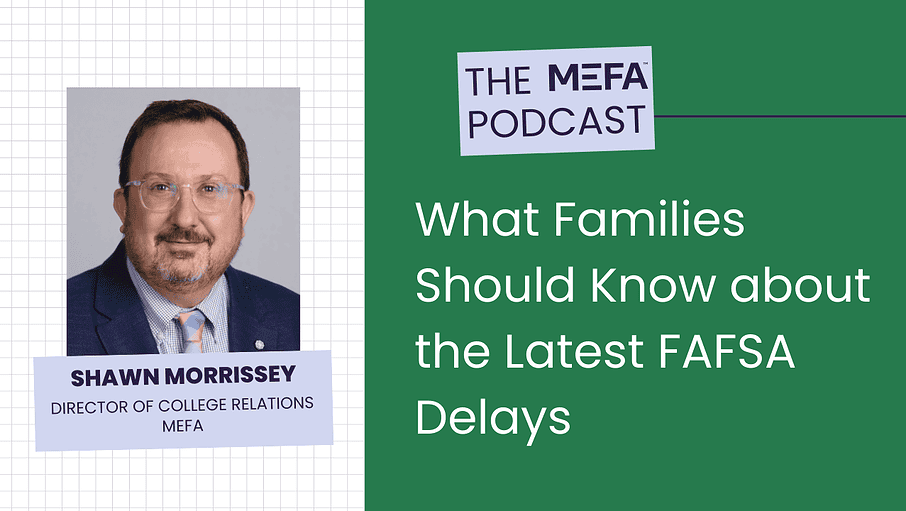

Resources Mentioned in this Episode
Jonathan Hughes: [00:00:00] Hello everyone and welcome to The MEFA Podcast. My name is Jonathan Hughes.
Julie Shields-Rutyna: And I’m Julie Shields-Rutyna.
Jonathan Hughes: Hey, Julie, how’s it going?
Julie Shields-Rutyna: Good. Good.
Jonathan Hughes: We have yet another FAFSA show, right? Because the FAFSA just, it keeps being news. And so families are still struggling with the FAFSA this year. And the consequences of the FAFSA delays that have been happening are continuing to ripple through the lives of students and parents and colleges, too. Here to update us on the FAFSA developments and the delays and what families are experiencing is MEFA’s Director of College Relations, Shawn Morrissey. Now, we at MEFA, of course, provide guidance on the FAFSA for free for anyone who wants to call us up at 1-800-449-MEFA or to visit us at [email protected] [00:01:00] and send us an email We have a bench of college guidance experts ready to do that. But honestly when I have a FAFSA question Shawn and he knows, that Shawn is the person that I go to so who better to have on this show than him Shawn welcome back
Shawn Morrissey: Thank you, Jonathan. I’m happy to be here.
Jonathan Hughes: Let’s bring everyone up to speed. Just tell us generally, what’s been going on with the FAFSA up to this point.
Shawn Morrissey: Sure. So the FAFSA became available on December 31st, but it was what they called a soft launch. So they brought it up a couple hours a day the first few days because they knew that there might be some errors that families were experiencing, so they would take it down and repair those errors as they could.
Until they finally got to the point where it was open 24/7, but there were still some small errors that some families were experiencing. There are things that are happening that aren’t supposed to work like they should and unfortunately, keeping some [00:02:00] families from being able to complete the FAFSA at all, or they complete the FAFSA with a few errors and then it’s submitted, but they end up in this in review status that they can’t correct at this point.
And that will be available for them to correct sometime. Hopefully in early March. That process will begin and we can talk about that a little bit further. But the FAFSA is up and running now 24/7 and there are still some known errors out there. The good news is for families who don’t experiencing any issues is that.
It’s taking them less than 10 minutes to fill out the FAFSA now, which is a lot quicker than it was in the past. So it is simpler for a lot of families. And in fact, we’re getting calls from families that say, I think I missed something. It was too easy to fill out what’s going on here. I wasn’t faced with any financial questions seamlessly now for families that [00:03:00] don’t experience problems.
So hopefully the- when all of this is fixed in the future of the FAFSA, it will be simpler for families and they will all have this really quick experience.
Julie Shields-Rutyna: Can you explain a little bit, if a family is able to file the FAFSA, what’s going on behind the scenes there? We get a lot of calls from students and parents that they I think they submitted, but they’re not.
Shawn Morrissey: Sure. So yeah, so families are submitting their FAFSA and then they’re supposed to receive an email confirmation that says, your FAFSA has been submitted right now. It’s no longer including the SAI which is the student aid index, which is the replacement of the EFC from the past. Yeah. They’re not receiving that like they did originally if they do receive that email, but they can check on their student aid.gov account. So they sign in with their FAFSA FSA ID. They can sign in [00:04:00] there, go on to their dashboard. And they can check the status of their application. It probably will stay in review right now, which means that and that’s where all of the FAFSAs are at this point. None of them have been processed.
They’re all in this holding tank right now, and they’re waiting to process those all. That will happen beginning in early March, and they’re going to be doing that in batches and start begin processing those FAFSAs. And once they process those FAFSAs, families will receive another email that says that their FAFSA has been processed and that will include on there their SAI, which is their Student Aid Index, and a summary of everything that they put on the FAFSA.
Which is called the FAFSA Submission Summary, the FSS. So they’ll be receiving that beginning in early March, and they are going to process those in batches first in, first out. So [00:05:00] those that file the FAFSA earliest will be processed earlier, and they’ll be sending those out in batches to students and to schools at that point in early March.
Jonathan Hughes: Talking to a family who did everything that they were supposed to do. They filled out the application. They got their FSA IDs. They submitted. And now they’re not sure if they did. Successfully submit. How can folks know that they did in fact file? Is there something that they can look at and know that they’ve done everything that they need to do at this point?
Shawn Morrissey: Yes. So they can log in back on student aid dot gov with their FSA ID. They want to go in with the students FSA ID. And then they can check the status of their FAFSA on their dashboard. They can see their What the status is, and if it says in review, that means that they did submit the FAFSA.
Jonathan Hughes: Just if it says in review, they’ve done it. They’ve submitted it. Excellent. Okay. Good to know. I do have one other [00:06:00] little question here and that is about that email confirmation with the student aid index on it because we have heard from some parents and some parents. Some students do go online to check out, other people’s reactions and other people’s experiences and see if they’re going through the same thing.
And there’s a little bit of a difference in people’s. experiences, right? Like some folks do get a certain email and some don’t, right?
Shawn Morrissey: That’s correct. So some students do receive the confirmation email that says that they have submitted their FAFSA. Others have not been receiving that at all. Families that submitted their FAFSA early in the process may have received, an email that had an SAI on that.
Now they are not including the SAI on any of the emails. So if you receive an email that said that you submitted that and you don’t see an SAI on there, don’t worry that you or think that you did something wrong. They’re just not including the SAI anymore in any of those. And the reason being for that is [00:07:00] they’ve made a couple of changes to the calculation behind the scenes, and so they’re recalculating SAI, so they don’t want to send out the wrong SAI to students before that’s finished and that’s another reason why they’re delaying the process of sending the ISERs to schools until early March is to get all those calculations correct.
Jonathan Hughes: Why don’t we mention that a little bit then if you could just explain for a brief moment what those adjustments are.
Shawn Morrissey: Yeah, so there were some adjustments that were made to the calculation behind the scenes for the income protection allowances and the asset protection allowances. And those are just in the calculation used to exclude from the formula a certain amount of family’s income or assets. And then they are adjusting those for inflation.
So that’s helpful to families that those protection allowances, there’s going to be more. income and assets that are excluded from the [00:08:00] calculation. So students SAIs based on these new calculations for inflation should be lower than they would have been if they didn’t include this inflation adjustment. So it’s good news for families that they’re recalculating all of this.
Julie Shields-Rutyna: Just this week, Shawn, I’ve been receiving a lot of questions, say from students or parents who want to add an additional college or make a correction or change to something they submitted on the FAFSA. So what do we tell them?
Shawn Morrissey: Yeah, so there, the correction process is not available for anyone yet. That will not become available until the FAFSAs begin processing in early March. So once you receive that email that says that your FAFSA has been processed, with that FAFSA submission summary, then you’ll be able to go in and make corrections on your FAFSA.
And that would be anything from simply adding another school to if [00:09:00] your FAFSA was submitted erroneously without a signature or something like that, you can then go in and make those corrections as well. So if you’ve been waiting because you know there was a problem or a glitch that happened when you were doing your FAFSA submission and you’re stuck in this place where you can’t make those changes, you’ll be able to do that in early March. Once you receive that email that says that your FAFSA has been processed.
Jonathan Hughes: How do the colleges not getting this info until, mid-March, the beginning of March impact a family schedule? We have it in our heads because we’ve been through many years of this cycle that, students file their FAFSA and their financial aid forms.
In the fall of the previous year, they get financial aid offers beginning around February or March sometimes and then they have until May to deposit May 1st to deposit at a college. How has all of this impacted that schedule, both with [00:10:00] deposit dates and even FAFSA deadlines at colleges.
Shawn Morrissey: So some schools are extending their financial aid deadlines. Some are keeping their deadlines, but are being flexible, knowing that families are experiencing some difficulties. So they’ll work with the families that are receiving problems and behind the scenes they’ll just. Work with them so that there’ll be some flexibility there for those that didn’t change their deadline in the same with the admissions enrollment deadline.
Some of those are being moved by some schools. So they’re extending those a little bit in some cases. Others are not extending their deadlines, but are going to do their best to get awards out to students before they have to make their decision. There are some schools that use another form called the CSS profile in addition to the FAFSA that will be able to send out awards earlier on a more normal schedule because they already have that data.[00:11:00]
Other schools that rely on only the FAFSA to award financial aid are going to need a little additional time once they receive those FAFSAs in order to start awarding aid to them. The FAFSAs will be sent to the schools starting in early March when students receive those emails saying that their FAFSA has been sent to the school.
But the awards may take a couple of weeks, at least, after that to come out because schools have to process those. Don’t be expecting that the minute you receive that letter saying that the school received your FAFSA that you’ll receive an award the next day. It will take a little time for schools to work through those.
But schools are going to do their best to get information out. To students that they can make those decisions. And we’re hearing from some schools, even those that do use that other form and are able to get out the awards on a more normal schedule that they may extend their enrollment [00:12:00] deadlines, knowing that students are not going to be able to receive awards from.
Other schools that they’re applying for, and they want students to be able to have all the information they need when they’re making a decision about where to enroll.
Julie Shields-Rutyna: Makes me happy that colleges, that some are changing deadlines and that some are just, being flexible with all of this.
So I think that’s really good news. Now we know that students when they complete the FAFSA, not only does it go to colleges and universities, it also goes to the state for them to apply for state aid. And the deadline for that is usually May 1st. Is that still the deadline for state aid?
Shawn Morrissey: So far, that is still the deadline for state aid, but they are monitoring the situation and if need be, they might extend that. But at this point, they’re keeping the May 1st deadline. But they are aware of the delays and they will be watching that closely.
Jonathan Hughes: What would be the message then that we have to families who have nothing they can do [00:13:00] essentially but sit and wait to either update their information or to await? Confirmation that their colleges have received their FAFSA. You can imagine that parents you probably experienced it, that they’re anxious.
Shawn Morrissey: Yes. Families are very anxious. I don’t know if this is good news, but the good news is everybody is in the same situation right now. It’s not as if some families information has been sent to schools and others are still waiting and are in this holding pattern, everyone’s in the same situation, financial aid offices.
Understand what’s going on really well. And they are working with families. They want to hear from families that are having. real issues that they can’t file the FAFSA at all. For example, families without a social security number, they’re urging them to contact them to see if there are other ways and methods that they can use to get them an estimated award.
So please reach out to financial aid offices if you have really extreme circumstances where [00:14:00] it’s not allowing you to submit a FAFSA at all. Those are situations where you should reach out to the financial aid office, but everyone is in the same holding pattern. So don’t think that you’re alone and that this is a special circumstance for you only that you’re still waiting.
So everyone’s in the same situation right now. And so it’s, everything’s delayed a little bit this year, but. All the colleges are aware of what’s going on. And everyone’s in the same situation.
Jonathan Hughes: I also, before we go, just want to mention the webinars that you’ve been doing both last night and today that I think should be available for folks to view if they want to on MEFA.org. And we can link to those, but I don’t know if you want to just mention those.
Shawn Morrissey: Sure. So we did One just this morning for school counselors. We did one yesterday with Massachusetts colleges about the delays happening with the FAFSA. And we have another 1 [00:15:00] for families coming up next week. So that will be during school vacation week at 4 o’clock on Wednesday and that will also be available for families. We will record that. And so if you’re not able to watch that live, you can register for that and receive the recording or watch the recording later on our website. If you go to mefa.org/events, you can do that and register for that.
Jonathan Hughes: Thanks. Is there anything else before we go, Julie?
Julie Shields-Rutyna: No, I think Shawn. You really expressed everyone’s in the same boat. This is very frustrating. It’s really hard, especially hard for families. But it’s, we’re moving forward and there’s a lot of help out there for students. So take advantage of that.
Jonathan Hughes: All right. Thank you very much, Shawn.
Shawn Morrissey: Thank you.
Jonathan Hughes: Thanks Julie.
Julie Shields-Rutyna: Thank you, Jon.[00:16:00]
Jonathan Hughes: Thanks again, Shawn, for being here. Remember everyone, if you liked what you heard today on the show and you want to learn more from MEFA about planning, saving, and paying for college and career readiness, then you can follow the show wherever you get your podcasts. And please remember to leave us a review.
It just helps us to keep doing what we’re doing and getting the show out. I also want to thank Julie Shields-Rutyna, Shaun Connolly, our producer, and I want to thank AJ Yee, Lauren Danz, and Lisa Rooney for their assistance in getting the show posted. Once again, my name is Jonathan Hughes and this has been The MEFA Podcast.













